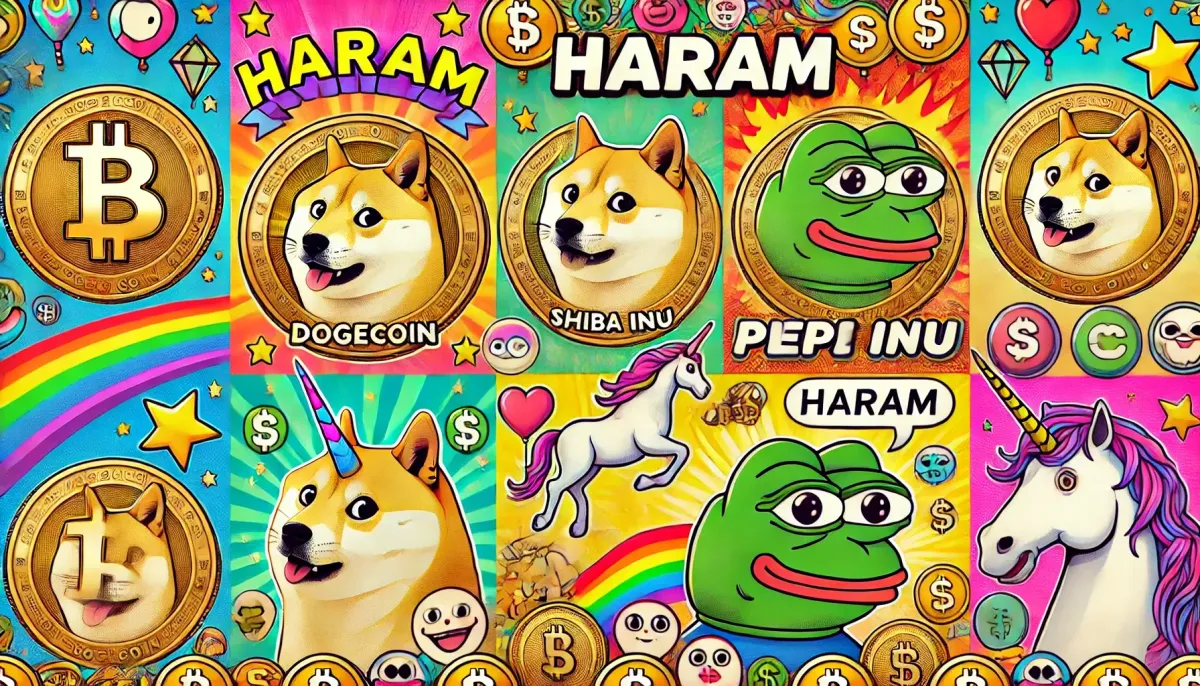With crypto’s surge, meme coins—driven by internet hype and social media—have drawn massive interest from quick-profit seekers. Yet, their speculative nature raises questions about Shariah compliance. Are meme coins halal or haram? Let’s find out ...
What Are Meme Coins?
Meme coins are a form of cryptocurrency created around humorous or viral internet themes, such as Shiba Inu dogs, frogs, or even political figures. Unlike Bitcoin or Ethereum, which provide established financial utility, meme coins often lack intrinsic value and rely heavily on community-driven popularity and market speculation. Dogecoin and Shiba Inu are two of the most popular examples, drawing millions of dollars from investors since their inception. However, they remain primarily speculative assets, largely bought and sold based on fleeting hype.
Speculation and Maysir (Gambling) in Meme Coins
In Islamic finance, maysir—or gambling—is strictly prohibited. Investments that foster a gambling mindset, where profit relies on unpredictable outcomes rather than careful valuation, are generally regarded as impermissible. Meme coins, due to their speculative nature, align closely with this type of prohibited behavior. As Mufti Taqi Usmani, a leading scholar in Islamic finance, explains, Islam encourages investments grounded in tangible, ethical value, not those motivated by sheer chance or market manipulation.
The speculative aspect of meme coins also draws them closer to gharar, or excessive uncertainty, another prohibited aspect in Shariah finance. According to Sheikh Dr. Haitham al-Haddad, financial decisions that carry such extreme risk, particularly those that rely on volatile price swings rather than any real value, violate Islamic financial ethics.
Pump-and-Dump Schemes in Meme Coins
Meme coins are notorious for their vulnerability to “pump-and-dump” schemes, where early investors create hype to inflate the price, only to quickly sell off their holdings, leaving later investors with heavy losses. This pattern, often seen across various meme coin launches, reflects a predatory financial behavior that Islamic finance categorically condemns. Sheikh Yasir Qadhi and other scholars emphasize the ethical imperative for Muslim investors to avoid investments that could harm others or create market imbalance.
High Failure Rate in Meme Coins: A Losing Bet for Most
Analyzing the Performance and Longevity of Meme Coins
Meme coins suffer from an exceptionally high failure rate, making them among the riskiest assets in the crypto space. According to 2024 data from AlphaQuest and Chainplay, 97% of meme coins launched in recent years have failed. The average lifespan of these projects is often less than a year, in stark contrast to the three-year average for more utility-based cryptocurrencies.
An estimated 2,000 meme coin projects become inactive each month, highlighting the unsustainable nature of these assets. Studies indicate that while some meme coins—such as Shiba Inu and Dogecoin—have garnered notable attention, most meme coins rapidly lose value after initial hype. For example, celebrity-backed meme coins have been known to crash by over 90% once the initial promotional phase wanes. The high failure rate reflects the limited resilience of meme coins, especially those launched around temporary trends.
Such statistics should serve as caution for Muslim investors, as they underscore the likelihood of financial loss in meme coin investments. Scholars like Mufti Faraz Adam advise Muslim investors to prioritize assets with clear utility and tangible societal benefits, avoiding high-risk ventures like meme coins that primarily offer speculative rewards.
Lack of Intrinsic Value in Meme Coins
Islamic finance principles mandate that assets should have intrinsic value or utility to be considered halal. This can include real estate, businesses, or even certain digital assets like Bitcoin, which can serve as a decentralized medium of exchange. Meme coins, however, fall short of this standard. They do not fulfill any essential need, and their value is typically derived solely from market demand and community hype.
Sheikh Dr. Monzer Kahf, a prominent Islamic economist, has discussed how digital assets must fulfill clear, ethical objectives to meet Shariah compliance. Investments in assets without intrinsic worth or utility are discouraged, as they foster a market environment focused on fast gains over substantive contributions.
Shariah-Compliant Alternatives to Meme Coins
The high-risk, speculative nature of meme coins does not align with Shariah principles of responsible and ethical investing. For Muslim investors looking for Shariah-compliant crypto assets, numerous options exist within the decentralized finance (DeFi) sector. These alternatives include assets that facilitate ethical financial services, social impact projects, and blockchain solutions for sectors like finance, healthcare, or education, offering both value and stability.
Islamic Perspective on Ethical Investment
In Islam, wealth is considered a means of achieving social good, and investments are meant to reflect this. Islamic finance encourages wealth-building through means that contribute to the welfare of society rather than promoting speculation or gambling. Ethical considerations—such as avoiding harm to others, encouraging fairness, and promoting transparency—are central to this framework.
Mufti Ismail Desai has stated that for a financial instrument to be halal, it should contribute positively to society or provide real, lasting value. Meme coins, driven largely by speculation, fail to meet this criterion and are often associated with market manipulation, adding further reason for Muslim investors to exercise caution.
Conclusion: Should Muslims Avoid Meme Coins?
Based on the principles of Islamic finance and the high failure rate among meme coins, these assets do not meet Shariah compliance. Meme coins lack intrinsic value, encourage speculation, and are highly prone to unethical trading practices. Moreover, with a 97% failure rate and an average lifespan of under one year, meme coins typically result in financial loss for most investors.
Muslim investors are encouraged to avoid meme coins due to their speculative, high-risk nature and lack of real-world value, which conflicts with Shariah principles. Instead, focusing on assets like Ethereum and Solana offers a Shariah-compliant path to investing in cryptocurrencies with meaningful utility and stability. Ethereum powers DeFi and smart contracts, while Solana supports efficient, low-cost applications across finance and gaming.


